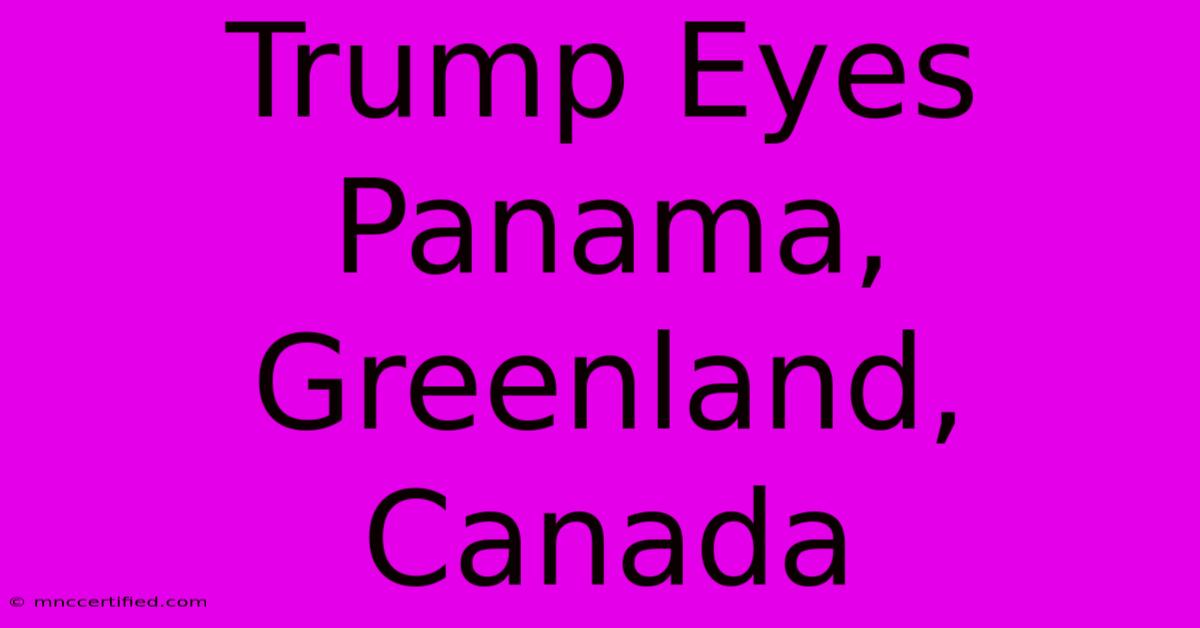Trump Eyes Panama, Greenland, Canada

Table of Contents
Trump Eyes Panama, Greenland, Canada: A Look at the Geopolitical Implications
Donald Trump's pronouncements and actions regarding Panama, Greenland, and Canada during his presidency sparked considerable debate and raised important geopolitical questions. This article delves into his statements and proposed actions concerning these three distinct regions, analyzing their potential impacts and implications on international relations.
Panama: Beyond the Canal
While Trump's administration didn't significantly alter US-Panama relations regarding the Panama Canal, his rhetoric on trade and immigration indirectly impacted the relationship. His emphasis on renegotiating trade deals and tightening border security had potential ramifications for Panama, a key trading partner and a nation grappling with migration flows.
Trade and Tariffs: A Shifting Landscape
Trump's "America First" policy and implementation of tariffs created uncertainty for Panama's economy, which relies heavily on trade with the United States. While the Panama Canal remained a crucial artery of global commerce, the overall trade climate shifted, presenting both challenges and opportunities for Panama. The impact of these trade policies remains a subject of ongoing analysis by economists and political scientists. Understanding the nuances of this relationship requires careful consideration of trade data and its impact on Panama's GDP.
Immigration and Security: A Shared Concern
Trump's hardline stance on immigration also affected the US-Panama relationship. Panama, like many Central American nations, faces challenges related to migration. Trump's administration's policies, including border wall proposals and stricter immigration enforcement, indirectly influenced Panama's own immigration policies and its efforts to manage migration flows. The evolving security cooperation between the two nations deserves further scrutiny.
Greenland: A Land Grab Controversy
Trump's reported interest in purchasing Greenland ignited a significant international controversy. The proposal, met with widespread derision from the Danish government and Greenlandic officials, highlighted the complexities of sovereignty, territorial claims, and the potential for great power competition in the Arctic.
Sovereignty and Self-Determination: A Key Issue
Trump's alleged interest in purchasing Greenland raised fundamental questions about Greenland's sovereignty and self-determination. Greenland, an autonomous territory within the Kingdom of Denmark, possesses a unique political status. Any attempt to acquire Greenland, without the full consent of the Greenlandic people and the Danish government, would have been a clear violation of international norms and principles of self-determination. The controversy served as a stark reminder of the importance of respecting national sovereignty in the 21st century.
Strategic Importance of the Arctic: Resources and Geopolitics
Greenland's strategic location in the Arctic makes it a region of growing geopolitical interest. The Arctic holds significant untapped natural resources, including oil, gas, and minerals. Furthermore, the melting Arctic ice cap opens new shipping routes, enhancing the region's strategic importance. Trump's interest in Greenland, therefore, can be interpreted within the broader context of great power competition in the Arctic. Understanding the geopolitical dynamics of the Arctic is crucial for comprehending Trump's actions and their potential implications.
Canada: A Complex Relationship
Trump's presidency presented both challenges and opportunities for the Canada-US relationship. Trade disputes, particularly regarding the renegotiation of NAFTA (now USMCA), strained relations. However, the two countries also continued to cooperate on various issues, including security and defense.
NAFTA/USMCA: Trade Tensions and Cooperation
The renegotiation of NAFTA under Trump's administration introduced significant uncertainty and tension into the Canada-US relationship. While the resulting USMCA maintained the core framework of free trade, it also incorporated changes that impacted various sectors of the Canadian economy. Analyzing the long-term economic consequences of the USMCA is a crucial task for understanding Canada's relationship with the United States.
Security and Defense: A Continuing Partnership
Despite trade disputes, Canada and the United States maintained a strong partnership in security and defense. The two countries continue to cooperate on various fronts, including counterterrorism, border security, and NORAD (North American Aerospace Defense Command). This enduring cooperation underscores the fundamental importance of the Canada-US relationship despite periodic political disagreements. The continued alliance between Canada and the United States requires further study given the evolving geopolitical landscape.
Conclusion: A Legacy of Geopolitical Uncertainty
Trump's actions and statements concerning Panama, Greenland, and Canada reveal a complex tapestry of geopolitical ambitions, economic policies, and international relations. His approach often challenged established norms and practices, leaving a legacy of uncertainty and prompting ongoing debate among policymakers, scholars, and the public. A thorough understanding of these events requires careful analysis of both the immediate impacts and the long-term consequences of his decisions. Further research into these relationships will be vital to understanding the evolving global landscape.

Thank you for visiting our website wich cover about Trump Eyes Panama, Greenland, Canada. We hope the information provided has been useful to you. Feel free to contact us if you have any questions or need further assistance. See you next time and dont miss to bookmark.
Featured Posts
-
Matt Gaetz House Power Climb
Dec 24, 2024
-
Morrisons Fewer Click And Collect Orders
Dec 24, 2024
-
Mbappes Return Fuels Real Madrid Victory
Dec 24, 2024
-
2024s Primetime Five Memorable Events
Dec 24, 2024
-
Nordstrom Familys 6 25 B Nordstrom Buyout
Dec 24, 2024